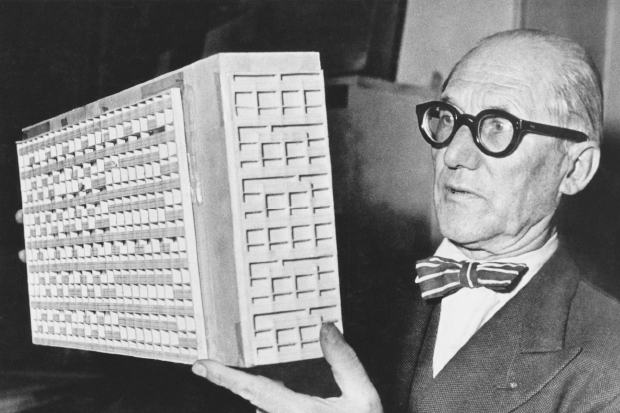The ‘revelations’, 50 years after he drowned, that Le Corbusier was a ‘fascist’ and an anti-Semite are neither fresh nor startling. Indeed they’re old hat. And it defies credibility that the authors of three recent books about this tainted genius were ignorant of what anyone with even the frailest interest in architects’ foibles and tastes has been aware of for years. Not that this has deterred them; nor has it deterred newspapers from filleting the books for supposedly sensational titbits.
What next? The hot news that the cuckold Carlo Gesualdo murdered his wife and her lover? That Jean Genet has been discovered to have been, you know, on the light-fingered side? But of course Gesualdo is not accused of providing the inspiration for vertical slums the world over. Genet did not fill the impressionable minds of baby architects with the ambition to start from zero by razing Paris to the ground.
Alive, Le Corbusier was a great architect. Posthumously, he has been a great scapegoat, an Aunt Sally who can be tirelessly derided for all of urban life’s ills because he rendered thought crimes concrete — and people know his name. Those crimes are, of course, primarily aesthetic.
The ‘revelations’ prompt, once again, the question of the extent to which his political thought between the early 1920s and the liberation of France was dependent upon and even determined by his proposed architectural and urbanistic programmes. The question has to be posed that way round: the contrary notion that his aesthetics were politically fomented is a non-starter. He might compromise himself but he never compromised his art. His manoeuvring was risibly opportunistic, obvious to all his targets. He shifted unconvincingly between the ever-mutating factions of French fascism.
The short-lived far-right party Le Faisceau, while keen on technocratic Taylorism and Fordism, was equally infected by a blood-and-soil folksiness derived from Barrès and was inimical to Le Corbusier’s ‘internationalist’ abstract purism: ‘internationalist’ meant Jewish.








Comments
Join the debate for just £1 a month
Be part of the conversation with other Spectator readers by getting your first three months for £3.
UNLOCK ACCESS Just £1 a monthAlready a subscriber? Log in